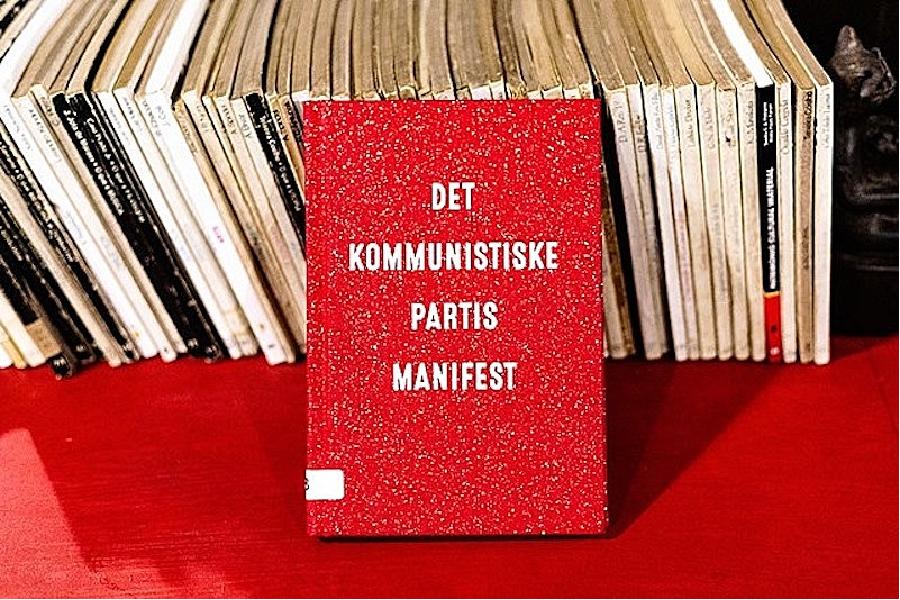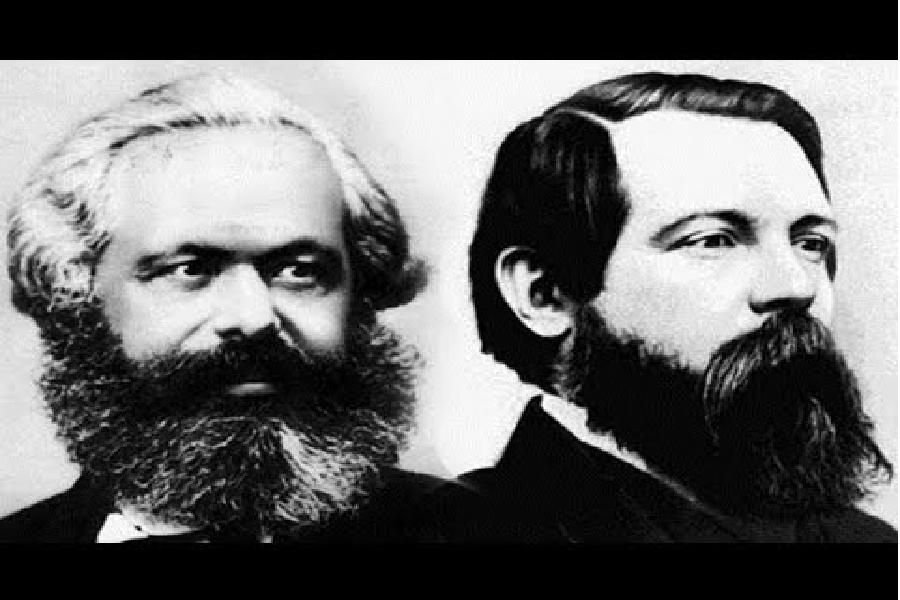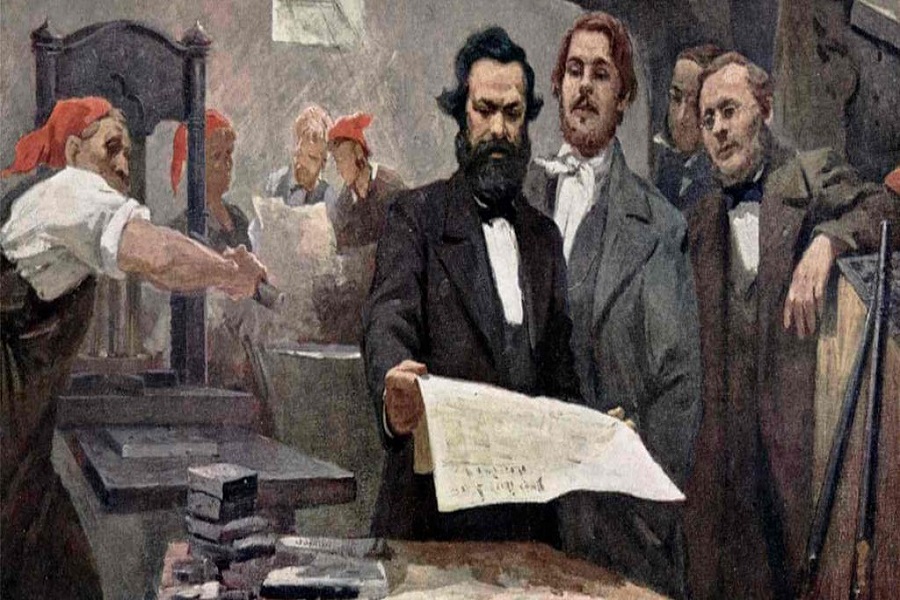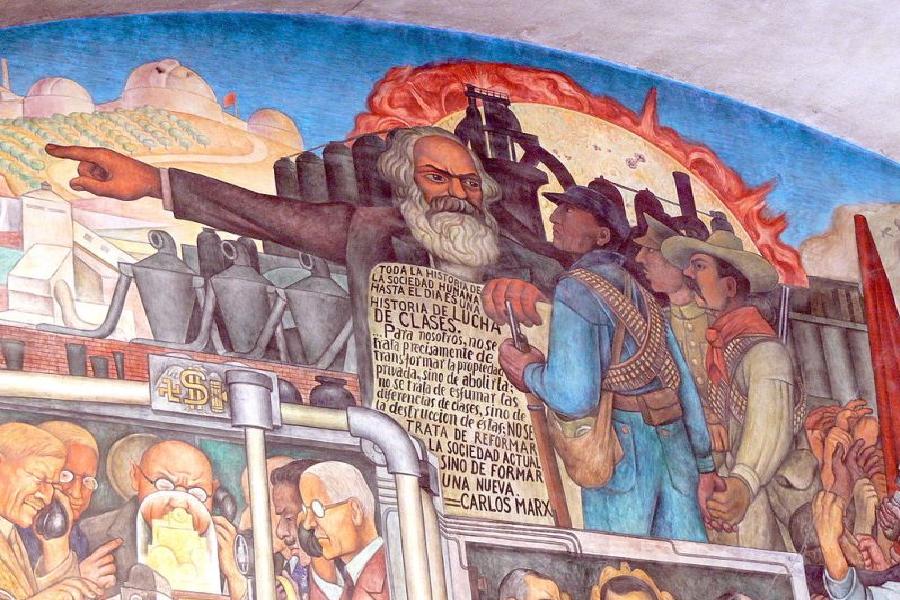In this section we will present an outline of the communist party manifesto, a very important and influential document in contemporary world history. Stay with us!

The manifesto in its German version
Introduction to the Communist Manifesto
Regardless of their ideology or political thinking, anyone would agree that the communist party manifesto it is one of the most important political alliances in all of history and an essential element to understand the second half of the XNUMXth century and the XNUMXth century.
Thanks to communist party manifesto, the entire development of ideas such as communism, socialism or Marxism was known. All of them, applied to various sociopolitical and economic fields or spheres of study, have helped to later define reality through their approaches.
In the year 1847 one of the high representatives of the communist organization of the time on the sides of Europe, convinced a couple of prominent philosophers to enter and once they accepted, they were assigned the task of writing a manifesto with the main ideas of communism.
As a result of the assignment of the task was obtained was a twenty-three-page pamphlet of the League of Communists. This document was published on February 21, 1848 in London, created by Karl Marx and Friedrich Engels.
Communist Manifesto Content Summary
This writing, also called, document-program of scientific communism, the communist party manifesto, Lenin considers that it was written with great clarity and brilliance, a new conception of the world is outlined; a consistent materialism, which encompasses the domain of social life.
Dialectics, as the deepest and most general doctrine of development; the theory of class struggle and the world-historical revolutionary role of the proletariat, creator of the new communist society. For Stalin, this manifesto is “the song of songs of Marxism”.
During the 1880s the influence of Marx's thought increased among the workers' parties and the circulation of the so-called manual of the communists spread throughout the world.
Interest in Marx's work took hold and grew through his role in the International Workers' Association between 1864 and 1872 as well as through the rise of two working-class parties in Germany founded by members of the League of Communists. Marx was considered a subversive leader, feared by governments because of his defense of the Paris Commune.
Engels wrote a new preface to bring the text up to date in the wake of the revolutionary movements of 1848, although it was not legally distributed. At least nine editions in six languages were published in this period. You may also be interested in the following article about contemporary literature.
Communist manifesto chapters
El communist party manifesto It is made up of four chapters: 1) The bourgeoisie and the proletariat; 2) The proletarians and the communists; 3) Socialist and communist literature; 4) The relations of the communists with the different opposition parties.
Chapter I: The Bourgeoisie and the Proletarians
The idea of Marx and Engels, gives a brief approach to the historical change of the slave society for the feudal, the class struggle as the fundamental law of the development of all antagonistic societies and the feudal for the capitalist.
In addition, they analyze the causes of the inevitable collapse of capitalism, due to the force of its irreconcilable internal contradictions and give importance to the final objective of the working class: Communism.
The downfall of the bourgeoisie and the triumph of the proletariat, write Marx and Engels, are "equally inevitable." They present a kind of confrontation: the proletariat has to displace the bourgeoisie, which has generated an economic system that suffocates society.
It is worth noting that, without a doubt and reaffirming what has already been written, one of the strengths of communism is the idea of struggle between the bourgeoisie and the proletariat. It must be confirmed that in this struggle, the proletariat has to put an end to the bourgeoisie, which has created an economic system that suffocates society.
El communist party manifesto lays the foundations and recommends that for this, they must carry out a revolution that ends with the established system and thus be able to create a communist government that treats the proletariat as it deserves.
Chapter II: The Proletarians and the Communists
This chapter focuses on explaining the fundamentals of the role of the Communist Party, as an inseparable formation of the working class and its vanguard, as well as the description and presentation of the program of the Communist Party. The fundamental objective of the program of struggle followed by the communists is:
- The disappearance of private property over the means of production and the imposition of social property, on which all possibilities for the free development of the individual and the flourishing of culture and science will be opened.
- Economic-social relations will only be achieved through the communist revolution, causing a radical change in social existence and in the consciousness of men.
Lenin also said that in the manifesto is found the ingredient of “one of the most notable and important ideas of Marxism on the problem of the state, namely, the dictatorship of the proletariat. The first step of the workers' revolution, write Marx and Engels, is the conversion of the proletariat into a ruling class.
Chapter III: Socialist and Communist Literature
In this chapter there is a profound critique of the various socialist, non-proletarian, manifestations and currents that coexisted before the communist manifesto was written and during the period of its writing and preparation.
Chapter IV: The relations of the communists with the different opposition parties
In this last chapter of the manifesto we can find the bases of the strategy and tactics of the Communist Party. It indicates that the communists support, without any doubt, any revolutionary movement directed against the existing political and social regime, even the unconditional struggle against the bourgeoisie and against feudalism.
However, the communists never forget the fundamental question: to form, among the workers, a clear conscience about the repressive opposition of the proletariat and the bourgeoisie.
Seeking in every corner where it could arise, the union and unification of the democratic forces of all countries, the communists loudly declare that their objectives can only be achieved through the overthrow by force of the entire existing regime until today.
In the phrase or call with which the communist manifesto ends: "Proletarians of all countries: unite!", the international character of the communist movement is proclaimed.
The triumph of socialism in the Union of Soviet Socialist Republics - USSR, led by the Lenin-Stalin party, brought with it the great triumph of the ideas set forth by Marx and Engels in this manifesto, manual and guide to the Communist Revolution.
The attitude of the communists towards other opposition parties
Since this is the underlying theme of the chapter, an opinion or point of view will be given below: If a dictatorship of the proletariat is installed, it will not be possible to find any other party than the communist, since there is no openness to an idea different from the one established by the party, that is, although the proletariat has carried out a revolution to get rid of the previous government and its system, once Communism is established, there will be no other form of government.

Marx and Engels
Main ideas of the Communist Manifesto
Considering that a review of the chapters of such an important treatise was made, we can highlight and summarize that one of the most important points of this book is undoubtedly the ideology that is housed in it, being Marx's own thoughts those that were reflected in this. The main ideas of the work and therefore of Marxist thought are:
- The society that exists in each country is given or framed in the mode of production of that country, that is, its social relations are derived from its economic relations.
- The social classes that appear after the integration of a socioeconomic model based on trade are quite unequal, leaving power in the hands of a very small group, while the great masses are exploited, since the former owns the means of production, even when the second works them.
- Private properties will be eliminated if the proletariat organizes itself to start a fight for its rights, carrying out a true revolution that ends the established socioeconomic system to reach the communist model, in which everyone receives equally. This will end the end of the rule of the bourgeoisie.
At first, when Marx explained his theory, he needed the bourgeoisie and it had to be a safe ally, because as the owner of the means of production and, therefore, of economic power, he needed their help to carry out a revolution that would end with the European governments, where the monarchies and the nobility had all the power.
It means then, that although at first we will find a union of the proletariat and the bourgeoisie to put an end to a pre-established system that did not benefit any of them, later on, it was clearly manifested to them what the relations between one and the other should be, turning their backs to finally create a true communist government.
communist literature
As is normal in all political thought or any other stream of tastes and preferences in life, the communist ideology will find a large number of followers. These will create their own literature with ideas from Marx and later Engels.
Unlike other cases, this literature was very abundant throughout Europe and the USA until the middle of World War II, moment in which communism began to be seen as a greater evil. Until then we will find a great compendium of literature that will try to explain the different economic systems that have existed throughout the centuries and how this moment in history has been reached.
The detractors of the communist manifesto
Instead of discussing whether Marxist ends are desirable, we will show only how his conclusions are incompatible both with his own premises and with empirical reality.
No mention will be made of the historical failure of Marxist projects, without making excuses such as “it was not real socialism”. We will attack the essential pillars to consider an economic theory «Marxist»: without supporting them, calling itself Marxist makes no sense, beyond pure nostalgia (which is not strictly understood).
1. Theory of wages
It should be taken into account the importance of whether it is believed that capitalism tends to collapse, it is because of its theory of wages. That is, Marxism as an economic theory is based on the following error: "Marx thought that workers in capitalism would only receive enough wages to cover the most basic needs of survival."
Marx detailed why he considered this process inevitable. Capitalism will necessarily cause, with wages, its own destruction his anti-scientific attitude: instead of reaching his conclusions and analysis, Marx came up with the conclusion that best suited his ideology and only later spent twenty years looking for a justification for it .
The idea is clear: any improvement in technology or education will always bring more surplus value, never more salary. Entrepreneurs will use wage cuts as a weapon among themselves to absorb each other, concentrating capital (on the relationship between this and the profit rate, a separate post would be necessary).
Over time, wages will fall until the slightest drop would starve the worker to death: the subsistence minimum. Thus, the system itself will lead the workers to such a miserable situation that they will rebel, giving way to socialism.
As after seven decades since the Manifesto wages had multiplied, Lenin ruled that this did not mean that Marx was wrong (no more), but that it was an anomaly resulting from the 'super-exploitation' of the colonies.
2. Ownership of the means of production
Marxism is centering your worldview on ownership of the means of production (MDP); everything else is anti-revolutionary. The social democrat who suggests putting the focus on income and wealth inequality (that is, saying rich and poor instead of bourgeois and proletarian) is accused of revisionism.
If the problem was not structural, at the base, capitalism could be reformed and the revolution would be unnecessary. Instead of socializing the means of production, it would suffice to redistribute their fruits.
3. Class interest
In this section it will be clarified how this supposes a triple error. From the economic logic of Game Theory, the owners and non-owners do not have objective, common and antagonistic interests. Let's see why:
- If the interest of the bourgeois class is that of the owners and the interest of the working class is that of those who are not owners, the previous section crystallizes here an obvious problem: what remains of the objective interest of the proletarian class when the entire world is petty bourgeois?
- If any bourgeoisified worker would live materially worse under socialism, no matter how much he considered it ideologically fairer, what common interest can the labor aristocracy have with the proletariat?
- It is possible that the workers would live worse under socialism (and the opposite occurs with certain petty bourgeoisie, such as the precarious self-employed), what antagonism remains when there are workers with anti-revolutionary interests and bourgeoisie with anti-capitalist interests?
All of this underscores the obvious, basing the analysis on “owners” and “non-owners” in order to say that reforming capitalism is impossible, it only causes problems. Contrary to talking about rich and poor, as suggested by the Social Democrats (whom the hard line of Marxism-Leninism exterminated, wherever they could).
As if that were not enough, as José Luis Ferreira points out, Marxism mischaracterizes the concept of class struggle. Starting from his erroneous idea of 'interest', he falls into functionalism (which Lenin himself would emphasize decades later), that it is convenient for a certain group to act in a certain way does not mean that it will do so.
4. Exploitation Theory
The same methodological awkwardness that led the Marxists to the three errors above is also reflected in their love-hate of the term "exploitation." We will see the problems generated by understanding it as "production in which the worker does not receive the full fruit of his work" (surplus value being the part that he does not receive).
Before delving into this, it is worth clarifying that Marx always spoke of exploitation forced. That is, the one in which the alternative to being exploited was to starve.
However, this 'blackmail' is an unnecessary premise: if there was a basic income that guaranteed sustenance, would those who decided to work receive the full fruit of their efforts? Obviously not. The capitalists would continue to keep the surplus value (according to the Marxist criterion). Ergo there would be exploitation, even if it was not forced.
Another untrue statement revolves around the idea of business management. Many Marxists believe that the entrepreneur does absolutely nothing. Big mistake!, the great Soviet economists like Nikolai Bukharin would point out. He takes risks, allocates capital, and organizes workers. That is his contribution to the production.
A committee of workers can take care of it (although doing so would reduce their productivity), but it is essential that someone acts as an entrepreneur. Marx does not call him an exploiter for receiving something without contributing anything, but for keeping what others contribute (in addition to what he contributes). Subtle difference. If you liked this article, I invite you to visit The city and the Dogs Book by Mario Vargas Llosa.


